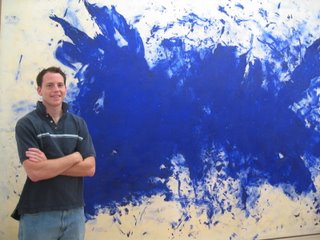Global Warming: Inhofe Out
Today NPR reports that Senator James Inhofe (R, Oklahoma), Chair of the Senate's Committee on Environment and Public Works, is giving up his gavel following the democrats appropriation of the majority. For those who still believe global warming is a giant hoax, this is really bad news. Inhofe, who has led the committee since republicans took control of the senate in 2002, has been an outspoken advocate of evidence disputing the hypothesis that the world is getting warmer as a result of carbon-dioxide emissions and rampant deforestation. He has called this hypothesis, which he distrusts so immensely: "A great hoax perpetrated on the American people."
Inhofe, who has led the committee since republicans took control of the senate in 2002, has been an outspoken advocate of evidence disputing the hypothesis that the world is getting warmer as a result of carbon-dioxide emissions and rampant deforestation. He has called this hypothesis, which he distrusts so immensely: "A great hoax perpetrated on the American people."
If you've seen the movie Thank You for Smoking, you are familiar with the type of work Inhofe has done these past four years. He insists the evidence of scientists is inconclusive in order to stall legislation that would hurt the oil & gas industry - which incidentally provides more campaign funding to Inhofe than to any other Senator in the United States (with the possible exception of John Cornyn (R, Texas)). In his own words Inhofe is insisting "on sound science," a seemingly respectable pursuit - albeit an impossible one.
A scientific hypothesis is, by its very nature, unprovable. A hypothesis can be supported or substantiated, and subsequently earn widespread credibility. But a hypothesis is just a working assumption which must concede to disproving evidence should it appear in future experimentation.
To stall policy while waiting for proof could stall policy indefinitely.
Here I must point out: it is one thing for scientists to reserve judgement ad infinitum, but another entirely for legislators to mull over evidence for centuries. The term given to lengthy study in science is 'investigation.' In congress, it's dubbed 'polemics.'
I'd like to be as objective as possible in my treatment of individuals on this site. To this end, I will try to assume that all human beings are well intentioned. Thus, I credit Inhofe for his judicious scrutiny of evidence and general consideration for the merits of many opinions. But I'll say flatly: I just do not see the same benefit to political inaction.
Politicians are supposed to be decision makers! Which is to say that they are effectually hired guessers. Confident guessing is part of the job!
In case you think Inhofe waits patiently for evidence in all matters, consider his reasons for the U.S. backing the Israeli state: "I believe very strongly that we ought to support Israel; that it has a right to the land. This is the most important reason: Because God said so. As I said a minute ago, look it up in the book of Genesis. It is right up there on the desk."
First I want to know how a Christian bible has infiltrated the Senate floor. Second, I wonder what sound science Inhofe has studied to cite the English translation of an ancient manuscript as a literal transcription of this god (of allegedly supreme credibility). Finally, I want to know why Inhofe's god has dominion over policy of the secular United States government. I wonder if Inhofe is familiar with more recent text: The U.S. Constitution.
According to Establishment Clause of the First Ammendment: "Congress shall make no law respecting an establishment of religion." So much for the actionability of the word of God.
If you've read Al Gore's book or seen his 2006 film, An Inconvenient Truth, as Inhofe has, I think you've seen compelling evidence that the earth is baking. While we can't prove the global warming hypothesis, the theory is widely credited.
The evidence is in! Inhofe's out! It's time for the committee to start acting!


